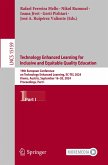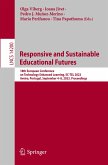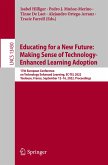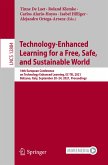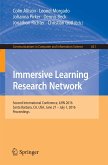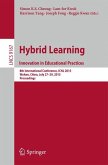Two Decades of TEL. From Lessons Learnt to Challenges Ahead
20th European Conference on Technology Enhanced Learning, EC-TEL 2025, Newcastle upon Tyne and Durham, UK, September 15-19, 2025, Proceedings, Part II
Herausgegeben:Tammets, Kairit; Sosnovsky, Sergey; Ferreira Mello, Rafael; Pishtari, Gerti; Nazaretsky, Tanya
Two Decades of TEL. From Lessons Learnt to Challenges Ahead
20th European Conference on Technology Enhanced Learning, EC-TEL 2025, Newcastle upon Tyne and Durham, UK, September 15-19, 2025, Proceedings, Part II
Herausgegeben:Tammets, Kairit; Sosnovsky, Sergey; Ferreira Mello, Rafael; Pishtari, Gerti; Nazaretsky, Tanya
- Broschiertes Buch
- Merkliste
- Auf die Merkliste
- Bewerten Bewerten
- Teilen
- Produkt teilen
- Produkterinnerung
- Produkterinnerung
The two-volume set LNCS 16063-16064 constitutes the proceedings of 20th European Conference on Technology Enhanced Learning, EC-TEL 2025, which took place in Newcastle upon Tyne and Durham, UK, September 2025.
The total of 43 full papers, including 37 research papers, 4 blue-sky and 2 industry papers, as well as 16 demos and 32 posters papers presented in EC-TEL 2025 proceedings was carefully reviewed and selected from 195 submissions. They focus on all aspects of dynamic interdisciplinary field, bridging pedagogy, educational psychology, and digital technology.
Andere Kunden interessierten sich auch für
![Two Decades of TEL. From Lessons Learnt to Challenges Ahead Two Decades of TEL. From Lessons Learnt to Challenges Ahead]() Two Decades of TEL. From Lessons Learnt to Challenges Ahead62,99 €
Two Decades of TEL. From Lessons Learnt to Challenges Ahead62,99 €![Technology Enhanced Learning for Inclusive and Equitable Quality Education Technology Enhanced Learning for Inclusive and Equitable Quality Education]() Technology Enhanced Learning for Inclusive and Equitable Quality Education61,99 €
Technology Enhanced Learning for Inclusive and Equitable Quality Education61,99 €![Responsive and Sustainable Educational Futures Responsive and Sustainable Educational Futures]() Responsive and Sustainable Educational Futures68,99 €
Responsive and Sustainable Educational Futures68,99 €![Educating for a New Future: Making Sense of Technology-Enhanced Learning Adoption Educating for a New Future: Making Sense of Technology-Enhanced Learning Adoption]() Educating for a New Future: Making Sense of Technology-Enhanced Learning Adoption66,99 €
Educating for a New Future: Making Sense of Technology-Enhanced Learning Adoption66,99 €![Technology-Enhanced Learning for a Free, Safe, and Sustainable World Technology-Enhanced Learning for a Free, Safe, and Sustainable World]() Technology-Enhanced Learning for a Free, Safe, and Sustainable World65,99 €
Technology-Enhanced Learning for a Free, Safe, and Sustainable World65,99 €![Immersive Learning Research Network Immersive Learning Research Network]() Immersive Learning Research Network38,99 €
Immersive Learning Research Network38,99 €![Hybrid Learning: Innovation in Educational Practices Hybrid Learning: Innovation in Educational Practices]() Hybrid Learning: Innovation in Educational Practices38,99 €
Hybrid Learning: Innovation in Educational Practices38,99 €-
-
-
The two-volume set LNCS 16063-16064 constitutes the proceedings of 20th European Conference on Technology Enhanced Learning, EC-TEL 2025, which took place in Newcastle upon Tyne and Durham, UK, September 2025.
The total of 43 full papers, including 37 research papers, 4 blue-sky and 2 industry papers, as well as 16 demos and 32 posters papers presented in EC-TEL 2025 proceedings was carefully reviewed and selected from 195 submissions. They focus on all aspects of dynamic interdisciplinary field, bridging pedagogy, educational psychology, and digital technology.
The total of 43 full papers, including 37 research papers, 4 blue-sky and 2 industry papers, as well as 16 demos and 32 posters papers presented in EC-TEL 2025 proceedings was carefully reviewed and selected from 195 submissions. They focus on all aspects of dynamic interdisciplinary field, bridging pedagogy, educational psychology, and digital technology.
Produktdetails
- Produktdetails
- Lecture Notes in Computer Science 16064
- Verlag: Springer / Springer Nature Switzerland / Springer, Berlin
- Artikelnr. des Verlages: 89575691, 978-3-032-03872-2
- Seitenzahl: 424
- Erscheinungstermin: 3. September 2025
- Englisch
- Abmessung: 235mm x 155mm x 23mm
- Gewicht: 640g
- ISBN-13: 9783032038722
- ISBN-10: 3032038723
- Artikelnr.: 74974372
- Herstellerkennzeichnung
- Springer-Verlag KG
- Sachsenplatz 4-6
- 1201 Wien, AT
- ProductSafety@springernature.com
- Lecture Notes in Computer Science 16064
- Verlag: Springer / Springer Nature Switzerland / Springer, Berlin
- Artikelnr. des Verlages: 89575691, 978-3-032-03872-2
- Seitenzahl: 424
- Erscheinungstermin: 3. September 2025
- Englisch
- Abmessung: 235mm x 155mm x 23mm
- Gewicht: 640g
- ISBN-13: 9783032038722
- ISBN-10: 3032038723
- Artikelnr.: 74974372
- Herstellerkennzeichnung
- Springer-Verlag KG
- Sachsenplatz 4-6
- 1201 Wien, AT
- ProductSafety@springernature.com
.- Blue-sky.
.- Generating Change: AI as an Opportunity to Address Long-standing OER Challenges.
.- A Web Application and Authoring Tool for Supporting the Generation of Ai-Based Avatars for Communication Scenarios.
.- Teaching with AI: The role of Teachers in the Hybrid Intelligent System.
.- Educator Professional Development Through LA and AIED Participatory Design: A Missing Link.
.- Industry.
.- A Citizen Science Approach to Co-Designing Hybrid Learning Scenarios in the Context of Vocational Secondary Education.
.- Turning Competency Data into Actionable Insights for Teachers.
.- Poster.
.- Generating AI Images for the OER Conversion Tool convOERter".
.- Exploring Human-AI Collaboration in Flipped Learning Design: A Comparative Study of Generative AI and Pedagogical Patterns.
.- Towards Capturing Teacher Agency Manifestations within Orchestration Activities: A Conceptual-Analytical Framework.
.- Designing the Course Load Analytics Platform.
.- How Expertise Levels Shape Preferences and Reflection Needs: Towards AI Reflection Systems for Teacher Empowerment.
.- Error Classification in Stoichiometry Tutoring Systems with Different Levels of Scaffolding: Comparing Rule-Based Classification and Machine Learning.
.- Teacher Agency in Implementing Automated Writing Evaluation Systems in a Science Classroom: A Focus Group Study.
.- Can Large Language Models Identify Locations Better Than Linked Open Data for U-Learning?.
.- Assessing Confusion's Impact in Entrepreneurial Learning with Electrodermal Activity.
.- Students' use of digital technologies to support emotion regulation when learning online.
.- Scaffolding Learning Scenarios with a Socratic Chatbot: Insights from Educators.
.- Classifying Students Meta-Cognitive Comments.
.- Developing a survey on motivations, attitudes, and challenges of non-native participants in English-taught MOOCs.
.- CodeFarm: An application for the development of computational thinking through video games in early educational stages.
.- Devil's Advocates Wear AI: exploring the assistive role of AI in assessment, in a meaningful way.
.- Assessing the effect of performance prediction on students perceptions of courses.
.- Designing a study to evaluate the Impact of WebXR with GenAI on Student Engagement in Distance Education.
.- Transparent Risk Predictions and Explanatory Feedback: Boosting Engagement and Course Achievement in Online Professional Learning.
.- Supporting Learning Design for Sustainable Development Using Large Language Models.
.- Exploring the Complex Analytics Interplay of LMS Design, Usage, Academic Outcomes, and Perceived Workload: A Case Study.
.- KinderGPT: Promoting Children s AI Literacy Through Conversational AI Usability Evaluation and Practical Insights.
.- Temperature is All You Need: Approximating Human Mathematics Hint Efficacy with LLMs.
.- Reimagining TEL - redesigning technology for the promotion of students sense of belonging.
.- Towards developing a guideline for optimizing interface design of Intelligent Tutoring Software.
.- Partnering with AI: A Pedagogical Feedback System for LLM Integration into Programming Education.
.- Investigating the Effects of Motivational Pedagogical Agents on Student Learning and Choice Making in an Adaptive Learning System.
.- A Systematic Review of Integrating Knowledge Graphs with Large Language Models: Applications, Models, Evaluation Methods, and Opportunities.
.- Human-Agent Interaction and Collaboration in Education: A Review and Future Research Prospects.
.- Leveraging LLMs to Assess Tutor Moves in Real-Life Dialogues: A Feasibility Study.
.- Assisting Teachers in the Design of Feedback for Online Learning Using Large Language Models: A Theory-Driven Approach.
.- Multimodal Late Fusion Model for Problem-Solving Strategy Classification in a Machine Learning Game.
.- Are Students' Evaluations of Auto-graders Biased by Their Grades?.
.- Demo.
.- Development and Evaluation of a Personalised Toolkit to Support Primary School Teachers with Digital Literature Literacy.
.- Developing PeACE: A Pedagogical Agent for Children's Emotions.
.- Escreva Mais: A mobile application to enhancing writing skills in resource-constrained classrooms.
.- SIMBA: A Tool for Designing Generative AI Agents for Reflective Learning and Critical Thinking.
.- In-House GenAI for Corrective Formative Feedback in Higher Education.
.- Minds-On: supporting the learning of science concepts and reasoning skills.
.- Make an IMPECT on the Dancefloor!: An Immersive Learning Environment for the Development of Dance Choreography Skills.
.- myScripting as Educational Design Assistant.
.- PromptHive: Demonstrating Collaborative, Human-Centered OER Creation with LLMs.
.- Is My Conversation Really Constructing Knowledge? Epistemic and Transactivity Group Awareness Widgets to Raise Participant Awareness During Online Discourse.
.- ReflectionApp: AI-Driven Assistant for Scaffolding Student Reflections.
.- Design and evaluation of an open-source, locally deployed chatbot system for higher education.
.- Play My Math: Design and Implementation of a Course Creator Tool within a Mathematical Musician Digital Learning Platform.
.- Doctoral Educational Technology (DET): A GenAI-enhanced Platform to Support Doctoral Student Progress and Well-being through Single-case Analytics.
.- MAESTRO: Multi-Agent Educational System for Tutoring and Recommendation Orchestration.
.- Tutoria: Delivering Personalized Feedback at Scale with Artificial Intelligence.
.- Generating Change: AI as an Opportunity to Address Long-standing OER Challenges.
.- A Web Application and Authoring Tool for Supporting the Generation of Ai-Based Avatars for Communication Scenarios.
.- Teaching with AI: The role of Teachers in the Hybrid Intelligent System.
.- Educator Professional Development Through LA and AIED Participatory Design: A Missing Link.
.- Industry.
.- A Citizen Science Approach to Co-Designing Hybrid Learning Scenarios in the Context of Vocational Secondary Education.
.- Turning Competency Data into Actionable Insights for Teachers.
.- Poster.
.- Generating AI Images for the OER Conversion Tool convOERter".
.- Exploring Human-AI Collaboration in Flipped Learning Design: A Comparative Study of Generative AI and Pedagogical Patterns.
.- Towards Capturing Teacher Agency Manifestations within Orchestration Activities: A Conceptual-Analytical Framework.
.- Designing the Course Load Analytics Platform.
.- How Expertise Levels Shape Preferences and Reflection Needs: Towards AI Reflection Systems for Teacher Empowerment.
.- Error Classification in Stoichiometry Tutoring Systems with Different Levels of Scaffolding: Comparing Rule-Based Classification and Machine Learning.
.- Teacher Agency in Implementing Automated Writing Evaluation Systems in a Science Classroom: A Focus Group Study.
.- Can Large Language Models Identify Locations Better Than Linked Open Data for U-Learning?.
.- Assessing Confusion's Impact in Entrepreneurial Learning with Electrodermal Activity.
.- Students' use of digital technologies to support emotion regulation when learning online.
.- Scaffolding Learning Scenarios with a Socratic Chatbot: Insights from Educators.
.- Classifying Students Meta-Cognitive Comments.
.- Developing a survey on motivations, attitudes, and challenges of non-native participants in English-taught MOOCs.
.- CodeFarm: An application for the development of computational thinking through video games in early educational stages.
.- Devil's Advocates Wear AI: exploring the assistive role of AI in assessment, in a meaningful way.
.- Assessing the effect of performance prediction on students perceptions of courses.
.- Designing a study to evaluate the Impact of WebXR with GenAI on Student Engagement in Distance Education.
.- Transparent Risk Predictions and Explanatory Feedback: Boosting Engagement and Course Achievement in Online Professional Learning.
.- Supporting Learning Design for Sustainable Development Using Large Language Models.
.- Exploring the Complex Analytics Interplay of LMS Design, Usage, Academic Outcomes, and Perceived Workload: A Case Study.
.- KinderGPT: Promoting Children s AI Literacy Through Conversational AI Usability Evaluation and Practical Insights.
.- Temperature is All You Need: Approximating Human Mathematics Hint Efficacy with LLMs.
.- Reimagining TEL - redesigning technology for the promotion of students sense of belonging.
.- Towards developing a guideline for optimizing interface design of Intelligent Tutoring Software.
.- Partnering with AI: A Pedagogical Feedback System for LLM Integration into Programming Education.
.- Investigating the Effects of Motivational Pedagogical Agents on Student Learning and Choice Making in an Adaptive Learning System.
.- A Systematic Review of Integrating Knowledge Graphs with Large Language Models: Applications, Models, Evaluation Methods, and Opportunities.
.- Human-Agent Interaction and Collaboration in Education: A Review and Future Research Prospects.
.- Leveraging LLMs to Assess Tutor Moves in Real-Life Dialogues: A Feasibility Study.
.- Assisting Teachers in the Design of Feedback for Online Learning Using Large Language Models: A Theory-Driven Approach.
.- Multimodal Late Fusion Model for Problem-Solving Strategy Classification in a Machine Learning Game.
.- Are Students' Evaluations of Auto-graders Biased by Their Grades?.
.- Demo.
.- Development and Evaluation of a Personalised Toolkit to Support Primary School Teachers with Digital Literature Literacy.
.- Developing PeACE: A Pedagogical Agent for Children's Emotions.
.- Escreva Mais: A mobile application to enhancing writing skills in resource-constrained classrooms.
.- SIMBA: A Tool for Designing Generative AI Agents for Reflective Learning and Critical Thinking.
.- In-House GenAI for Corrective Formative Feedback in Higher Education.
.- Minds-On: supporting the learning of science concepts and reasoning skills.
.- Make an IMPECT on the Dancefloor!: An Immersive Learning Environment for the Development of Dance Choreography Skills.
.- myScripting as Educational Design Assistant.
.- PromptHive: Demonstrating Collaborative, Human-Centered OER Creation with LLMs.
.- Is My Conversation Really Constructing Knowledge? Epistemic and Transactivity Group Awareness Widgets to Raise Participant Awareness During Online Discourse.
.- ReflectionApp: AI-Driven Assistant for Scaffolding Student Reflections.
.- Design and evaluation of an open-source, locally deployed chatbot system for higher education.
.- Play My Math: Design and Implementation of a Course Creator Tool within a Mathematical Musician Digital Learning Platform.
.- Doctoral Educational Technology (DET): A GenAI-enhanced Platform to Support Doctoral Student Progress and Well-being through Single-case Analytics.
.- MAESTRO: Multi-Agent Educational System for Tutoring and Recommendation Orchestration.
.- Tutoria: Delivering Personalized Feedback at Scale with Artificial Intelligence.
.- Blue-sky.
.- Generating Change: AI as an Opportunity to Address Long-standing OER Challenges.
.- A Web Application and Authoring Tool for Supporting the Generation of Ai-Based Avatars for Communication Scenarios.
.- Teaching with AI: The role of Teachers in the Hybrid Intelligent System.
.- Educator Professional Development Through LA and AIED Participatory Design: A Missing Link.
.- Industry.
.- A Citizen Science Approach to Co-Designing Hybrid Learning Scenarios in the Context of Vocational Secondary Education.
.- Turning Competency Data into Actionable Insights for Teachers.
.- Poster.
.- Generating AI Images for the OER Conversion Tool convOERter".
.- Exploring Human-AI Collaboration in Flipped Learning Design: A Comparative Study of Generative AI and Pedagogical Patterns.
.- Towards Capturing Teacher Agency Manifestations within Orchestration Activities: A Conceptual-Analytical Framework.
.- Designing the Course Load Analytics Platform.
.- How Expertise Levels Shape Preferences and Reflection Needs: Towards AI Reflection Systems for Teacher Empowerment.
.- Error Classification in Stoichiometry Tutoring Systems with Different Levels of Scaffolding: Comparing Rule-Based Classification and Machine Learning.
.- Teacher Agency in Implementing Automated Writing Evaluation Systems in a Science Classroom: A Focus Group Study.
.- Can Large Language Models Identify Locations Better Than Linked Open Data for U-Learning?.
.- Assessing Confusion's Impact in Entrepreneurial Learning with Electrodermal Activity.
.- Students' use of digital technologies to support emotion regulation when learning online.
.- Scaffolding Learning Scenarios with a Socratic Chatbot: Insights from Educators.
.- Classifying Students Meta-Cognitive Comments.
.- Developing a survey on motivations, attitudes, and challenges of non-native participants in English-taught MOOCs.
.- CodeFarm: An application for the development of computational thinking through video games in early educational stages.
.- Devil's Advocates Wear AI: exploring the assistive role of AI in assessment, in a meaningful way.
.- Assessing the effect of performance prediction on students perceptions of courses.
.- Designing a study to evaluate the Impact of WebXR with GenAI on Student Engagement in Distance Education.
.- Transparent Risk Predictions and Explanatory Feedback: Boosting Engagement and Course Achievement in Online Professional Learning.
.- Supporting Learning Design for Sustainable Development Using Large Language Models.
.- Exploring the Complex Analytics Interplay of LMS Design, Usage, Academic Outcomes, and Perceived Workload: A Case Study.
.- KinderGPT: Promoting Children s AI Literacy Through Conversational AI Usability Evaluation and Practical Insights.
.- Temperature is All You Need: Approximating Human Mathematics Hint Efficacy with LLMs.
.- Reimagining TEL - redesigning technology for the promotion of students sense of belonging.
.- Towards developing a guideline for optimizing interface design of Intelligent Tutoring Software.
.- Partnering with AI: A Pedagogical Feedback System for LLM Integration into Programming Education.
.- Investigating the Effects of Motivational Pedagogical Agents on Student Learning and Choice Making in an Adaptive Learning System.
.- A Systematic Review of Integrating Knowledge Graphs with Large Language Models: Applications, Models, Evaluation Methods, and Opportunities.
.- Human-Agent Interaction and Collaboration in Education: A Review and Future Research Prospects.
.- Leveraging LLMs to Assess Tutor Moves in Real-Life Dialogues: A Feasibility Study.
.- Assisting Teachers in the Design of Feedback for Online Learning Using Large Language Models: A Theory-Driven Approach.
.- Multimodal Late Fusion Model for Problem-Solving Strategy Classification in a Machine Learning Game.
.- Are Students' Evaluations of Auto-graders Biased by Their Grades?.
.- Demo.
.- Development and Evaluation of a Personalised Toolkit to Support Primary School Teachers with Digital Literature Literacy.
.- Developing PeACE: A Pedagogical Agent for Children's Emotions.
.- Escreva Mais: A mobile application to enhancing writing skills in resource-constrained classrooms.
.- SIMBA: A Tool for Designing Generative AI Agents for Reflective Learning and Critical Thinking.
.- In-House GenAI for Corrective Formative Feedback in Higher Education.
.- Minds-On: supporting the learning of science concepts and reasoning skills.
.- Make an IMPECT on the Dancefloor!: An Immersive Learning Environment for the Development of Dance Choreography Skills.
.- myScripting as Educational Design Assistant.
.- PromptHive: Demonstrating Collaborative, Human-Centered OER Creation with LLMs.
.- Is My Conversation Really Constructing Knowledge? Epistemic and Transactivity Group Awareness Widgets to Raise Participant Awareness During Online Discourse.
.- ReflectionApp: AI-Driven Assistant for Scaffolding Student Reflections.
.- Design and evaluation of an open-source, locally deployed chatbot system for higher education.
.- Play My Math: Design and Implementation of a Course Creator Tool within a Mathematical Musician Digital Learning Platform.
.- Doctoral Educational Technology (DET): A GenAI-enhanced Platform to Support Doctoral Student Progress and Well-being through Single-case Analytics.
.- MAESTRO: Multi-Agent Educational System for Tutoring and Recommendation Orchestration.
.- Tutoria: Delivering Personalized Feedback at Scale with Artificial Intelligence.
.- Generating Change: AI as an Opportunity to Address Long-standing OER Challenges.
.- A Web Application and Authoring Tool for Supporting the Generation of Ai-Based Avatars for Communication Scenarios.
.- Teaching with AI: The role of Teachers in the Hybrid Intelligent System.
.- Educator Professional Development Through LA and AIED Participatory Design: A Missing Link.
.- Industry.
.- A Citizen Science Approach to Co-Designing Hybrid Learning Scenarios in the Context of Vocational Secondary Education.
.- Turning Competency Data into Actionable Insights for Teachers.
.- Poster.
.- Generating AI Images for the OER Conversion Tool convOERter".
.- Exploring Human-AI Collaboration in Flipped Learning Design: A Comparative Study of Generative AI and Pedagogical Patterns.
.- Towards Capturing Teacher Agency Manifestations within Orchestration Activities: A Conceptual-Analytical Framework.
.- Designing the Course Load Analytics Platform.
.- How Expertise Levels Shape Preferences and Reflection Needs: Towards AI Reflection Systems for Teacher Empowerment.
.- Error Classification in Stoichiometry Tutoring Systems with Different Levels of Scaffolding: Comparing Rule-Based Classification and Machine Learning.
.- Teacher Agency in Implementing Automated Writing Evaluation Systems in a Science Classroom: A Focus Group Study.
.- Can Large Language Models Identify Locations Better Than Linked Open Data for U-Learning?.
.- Assessing Confusion's Impact in Entrepreneurial Learning with Electrodermal Activity.
.- Students' use of digital technologies to support emotion regulation when learning online.
.- Scaffolding Learning Scenarios with a Socratic Chatbot: Insights from Educators.
.- Classifying Students Meta-Cognitive Comments.
.- Developing a survey on motivations, attitudes, and challenges of non-native participants in English-taught MOOCs.
.- CodeFarm: An application for the development of computational thinking through video games in early educational stages.
.- Devil's Advocates Wear AI: exploring the assistive role of AI in assessment, in a meaningful way.
.- Assessing the effect of performance prediction on students perceptions of courses.
.- Designing a study to evaluate the Impact of WebXR with GenAI on Student Engagement in Distance Education.
.- Transparent Risk Predictions and Explanatory Feedback: Boosting Engagement and Course Achievement in Online Professional Learning.
.- Supporting Learning Design for Sustainable Development Using Large Language Models.
.- Exploring the Complex Analytics Interplay of LMS Design, Usage, Academic Outcomes, and Perceived Workload: A Case Study.
.- KinderGPT: Promoting Children s AI Literacy Through Conversational AI Usability Evaluation and Practical Insights.
.- Temperature is All You Need: Approximating Human Mathematics Hint Efficacy with LLMs.
.- Reimagining TEL - redesigning technology for the promotion of students sense of belonging.
.- Towards developing a guideline for optimizing interface design of Intelligent Tutoring Software.
.- Partnering with AI: A Pedagogical Feedback System for LLM Integration into Programming Education.
.- Investigating the Effects of Motivational Pedagogical Agents on Student Learning and Choice Making in an Adaptive Learning System.
.- A Systematic Review of Integrating Knowledge Graphs with Large Language Models: Applications, Models, Evaluation Methods, and Opportunities.
.- Human-Agent Interaction and Collaboration in Education: A Review and Future Research Prospects.
.- Leveraging LLMs to Assess Tutor Moves in Real-Life Dialogues: A Feasibility Study.
.- Assisting Teachers in the Design of Feedback for Online Learning Using Large Language Models: A Theory-Driven Approach.
.- Multimodal Late Fusion Model for Problem-Solving Strategy Classification in a Machine Learning Game.
.- Are Students' Evaluations of Auto-graders Biased by Their Grades?.
.- Demo.
.- Development and Evaluation of a Personalised Toolkit to Support Primary School Teachers with Digital Literature Literacy.
.- Developing PeACE: A Pedagogical Agent for Children's Emotions.
.- Escreva Mais: A mobile application to enhancing writing skills in resource-constrained classrooms.
.- SIMBA: A Tool for Designing Generative AI Agents for Reflective Learning and Critical Thinking.
.- In-House GenAI for Corrective Formative Feedback in Higher Education.
.- Minds-On: supporting the learning of science concepts and reasoning skills.
.- Make an IMPECT on the Dancefloor!: An Immersive Learning Environment for the Development of Dance Choreography Skills.
.- myScripting as Educational Design Assistant.
.- PromptHive: Demonstrating Collaborative, Human-Centered OER Creation with LLMs.
.- Is My Conversation Really Constructing Knowledge? Epistemic and Transactivity Group Awareness Widgets to Raise Participant Awareness During Online Discourse.
.- ReflectionApp: AI-Driven Assistant for Scaffolding Student Reflections.
.- Design and evaluation of an open-source, locally deployed chatbot system for higher education.
.- Play My Math: Design and Implementation of a Course Creator Tool within a Mathematical Musician Digital Learning Platform.
.- Doctoral Educational Technology (DET): A GenAI-enhanced Platform to Support Doctoral Student Progress and Well-being through Single-case Analytics.
.- MAESTRO: Multi-Agent Educational System for Tutoring and Recommendation Orchestration.
.- Tutoria: Delivering Personalized Feedback at Scale with Artificial Intelligence.



